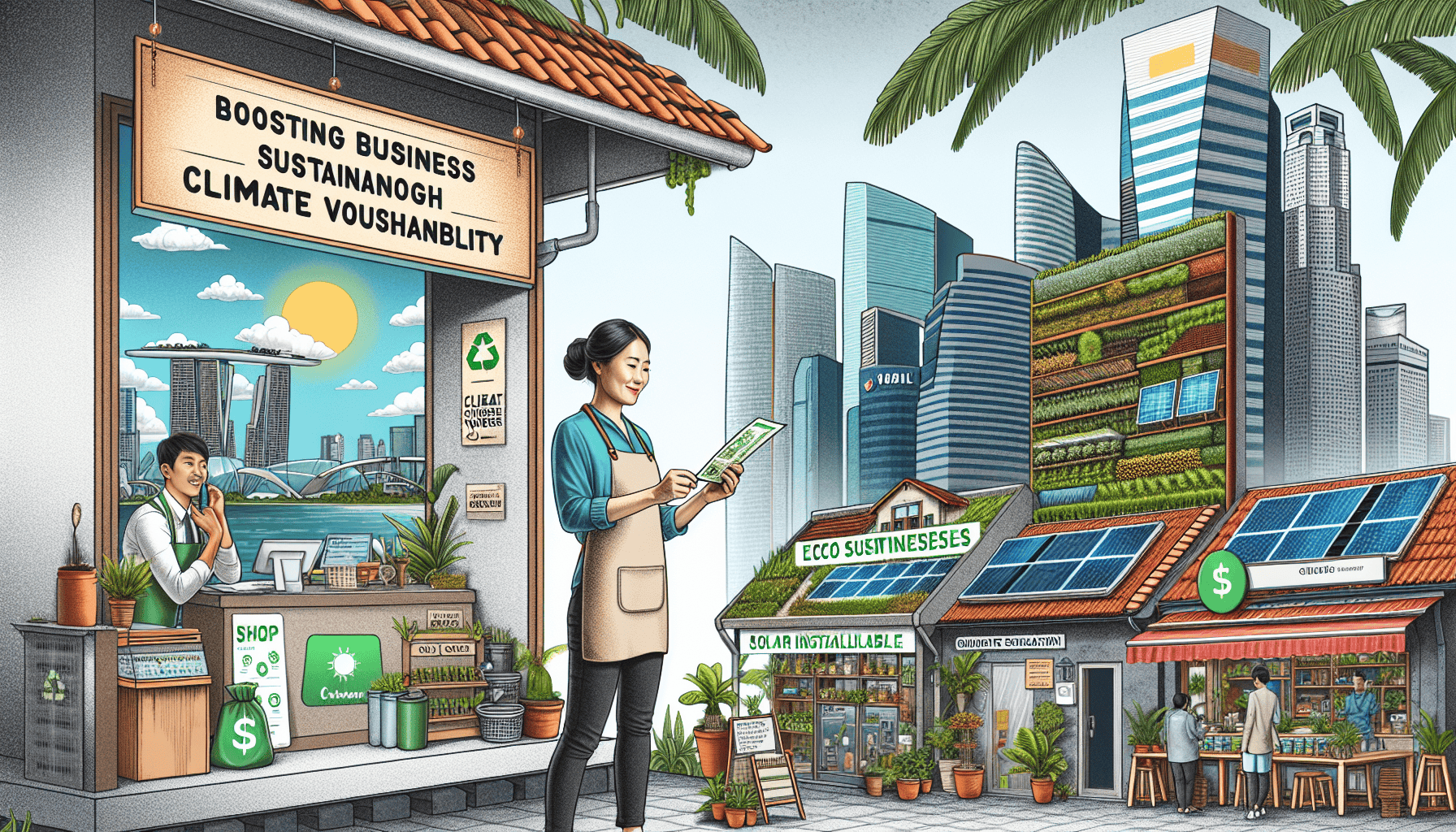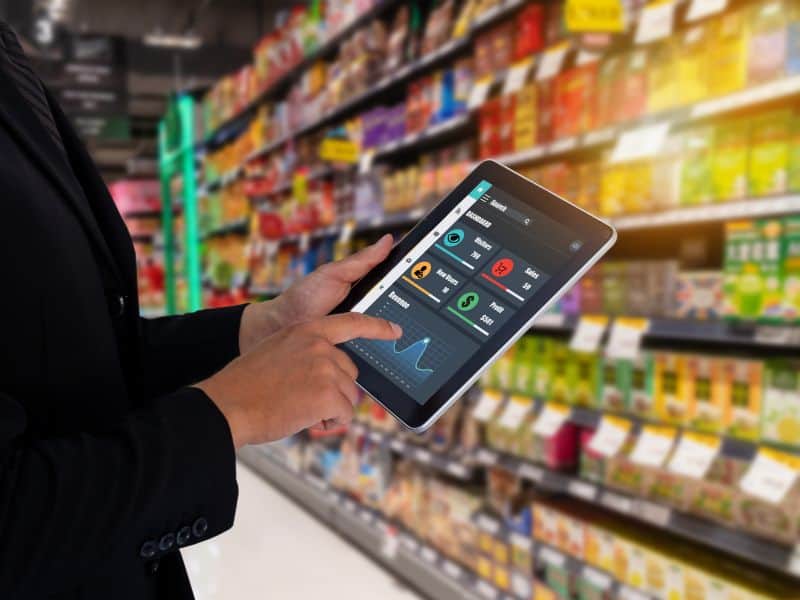
In Singapore, every HDB household is set to benefit from the Climate Vouchers initiative, with $300 vouchers available for claim until 31 December 2027, aimed at encouraging the purchase of energy- and water-efficient products. These vouchers can be used across 14 participating retailers, extending a unique opportunity for consumers to contribute to a more sustainable lifestyle.
This article outlines how POS system can integrate climate voucher redemption, highlights the program’s benefits for participating merchants, and explores the use of POS systems for sustainable marketing. Through real-world examples and a strategic guide, we aim to empower merchants in Singapore to enhance their business sustainability effectively.
Seamless Climate Voucher Redemption with POS System
To facilitate the integration of Climate Voucher redemption, the POS system must be compatible with the RedeemSG digital voucher system. This compatibility is crucial as it allows the scanning of QR codes, which is the primary method for voucher redemption.
At Edgeworks Solutions, we understand the importance of a smooth voucher redemption process. That’s why our POS systems are designed to integrate seamlessly with the RedeemSG digital voucher system. This ensures:
- Effortless QR code scanning: Customers simply present their Climate Vouchers for a quick and easy scan at checkout.
- Automated validation: Eliminate manual verification and potential errors with real-time voucher validation built directly into the system.
- Comprehensive training and support: Our dedicated team provides in-depth training on using the updated POS system for voucher redemption, troubleshooting issues, and ensuring a smooth flow even during peak periods.
- Continuous monitoring and feedback: We actively monitor the system’s performance and gather feedback from merchants, allowing for quick resolution of any challenges and constant improvement.
POS system play a pivotal role in the successful implementation of the Climate Vouchers program, thereby supporting Singapore’s sustainability efforts.
Why Merchants Should Participate in CFHP
Participating in the Climate Friendly Households Programme (CFHP) offers substantial benefits for merchants. Firstly, by accepting the $300 Climate Vouchers, retailers can see an increase in sales and expand their market reach. This is particularly significant as the vouchers cover a wide range of energy- and water-efficient products, which are increasingly in demand due to growing environmental awareness among consumers.
Moreover, the long validity period of the vouchers until December 31, 2027, provides a sustained opportunity for businesses to attract customers over an extended time. This extended period allows merchants to plan and implement long-term marketing strategies around the CFHP, enhancing their ability to benefit from the program.
Additionally, the inclusion of a diverse array of participating retailers—from large chains like FairPrice and Harvey Norman to local shops like T.S. Yong Trading—ensures that a wide variety of products are eligible under the program. This diversity not only caters to different consumer needs but also promotes competition among retailers, potentially leading to better prices and services for customers. By participating, merchants not only boost their sales but also contribute to national sustainability efforts, improving their brand image and customer loyalty.
Leveraging POS Systems for Sustainable Marketing
In today’s eco-conscious market, sustainability is not just a trend but a global imperative, and customers in Singapore are increasingly demanding eco-friendly business practices. For retailers, embracing sustainability is a strategic move that not only gives them a competitive edge but also attracts and retains customers who are conscious about their environmental impact.
Integration of Omnichannel and POS Systems
The integration of omnichannel management systems and POS systems plays a crucial role in driving eco-friendly practices. These systems help retailers reduce paper usage significantly by digitizing receipts and other customer interactions, which not only saves trees but also cuts down on waste. Furthermore, by optimizing inventory management, these systems reduce the need for excessive stock levels, which in turn decreases the carbon footprint associated with transportation and product disposal.
Sustainable Practices in Action
Several retailers in Singapore, including well-known names like Fairprice and Love, Bonito, have successfully integrated these systems to foster sustainable retail practices. These retailers champion initiatives such as green commuting, recycling programs, and incentives for customers who bring reusable bags, all of which contribute to a reduction in carbon emissions and promote a healthier ecosystem. By implementing these systems, retailers not only streamline their operations but also build customer trust and loyalty by aligning with their values on sustainability.
Through such strategic integration of technology and commitment to sustainability, merchants can significantly enhance their operational efficiency and contribute positively to environmental conservation efforts, making a lasting impact on both the market and the planet.
Case Studies: Success Stories from the Field
Leveraging Climate Vouchers for Business Growth
Businesses across Singapore have been utilizing the Climate Vouchers effectively, leading to notable success stories. For instance, local retailers have seen a surge in sales of energy-efficient appliances, thanks to the $300 Climate Vouchers provided to HDB households. This initiative not only boosts sales but also encourages the adoption of sustainable products, aligning with the government’s vision for a low-carbon society.
Public-Private Partnerships Enhancing Climate Initiatives
Significant strides have been made in climate finance through Public-Private Partnerships (PPPs). These collaborations amplify the impact of private investments and public funds, driving substantial advancements in climate action. For example, the collaboration between the government and major companies like Shell and ExxonMobil to explore cross-border carbon capture and storage projects showcases how PPPs can lead to innovative climate solutions.
SMEs at the Forefront of Sustainability
Small and Medium Enterprises (SMEs) play a pivotal role in the environmental transition. With the right support, such as the Sustainability Reporting Grant, SMEs are making significant contributions to sustainability. These grants help cover costs associated with preparing sustainability reports, encouraging SMEs to adopt greener practices and make climate disclosures aligned with international standards. This not only helps in reducing their environmental footprint but also positions them as leaders in sustainability, driving further innovation and greening efforts within their industries.
Conclusion
Throughout this guide, we’ve explored the significant potential that the Climate Vouchers initiative offers to merchants in Singapore, emphasizing the integration of redemption capabilities in POS systems, the educational benefits of participating in sustainability programs, and the impact of leveraging technology for eco-friendly business practices. By understanding and employing these strategies, businesses can not only witness a boost in sales and customer engagement but also contribute meaningfully to the broader objectives of environmental sustainability. The journey toward sustainability is both a challenge and an opportunity, urging merchants to innovate, adapt, and ultimately thrive in an increasingly eco-conscious market landscape.
As the path to sustainability continues to evolve, the role of merchants and technology providers becomes ever more critical. The successful stories highlighted, from effective use of Climate Vouchers to the strategic integration of systems, serve as a beacon for what is possible when innovation meets commitment. For those looking to delve deeper into how technology can support their sustainability goals and for personalized advice on integrating these practices, get in touch with us for more information on how we could help with the integration. Together, we can forge a greener future, benefitting not just our businesses but our planet as a whole.
FAQs
- What exactly are Climate Vouchers in Singapore?
Climate Vouchers are part of the Climate Friendly Households Programme, where each HDB household in Singapore is eligible to claim $300. These vouchers can be used to buy products that are energy-efficient and water-saving, helping households reduce their environmental impact. - How is Singapore addressing climate change?
As of 25 October 2022, Singapore has committed to a more aggressive climate action by aiming to reach net zero emissions by the year 2050. This goal is a key part of Singapore’s Long-Term Low-Emissions Development Strategy (LEDS). - What efforts has Singapore made to promote sustainability?
Singapore has implemented several unique sustainability practices. It is one of the few nations that has successfully managed to close the water loop, allowing for the repeated reuse of every drop of water. The country does not provide subsidies for fossil fuels and imposes a tax on carbon emissions. Additionally, since the early 2000s, Singapore has primarily used natural gas, the cleanest fossil fuel available, for power generation. - What are some effective sustainable strategies to combat climate change?
One impactful strategy is to change the energy source of your home. Installing solar panels on your roof to generate power or switching from traditional sources like oil, gas, or coal to renewable energy sources such as wind or solar can significantly decrease your carbon footprint. This change can potentially reduce up to 1.5 tons of CO2e (carbon dioxide equivalent) per year.




